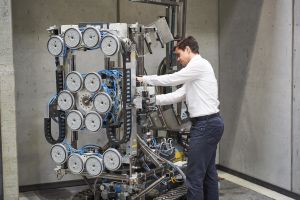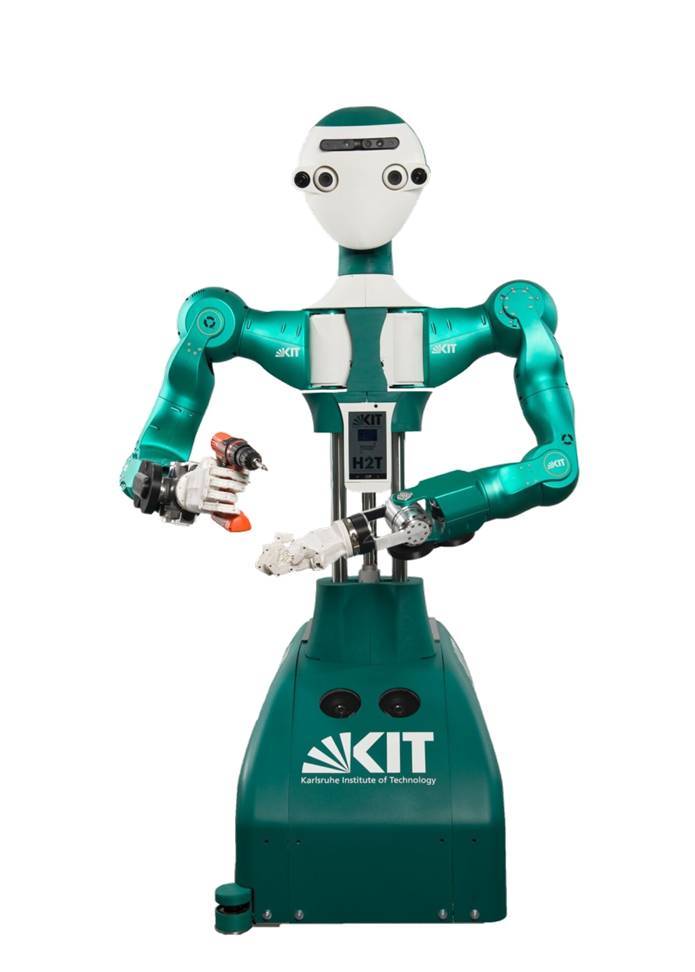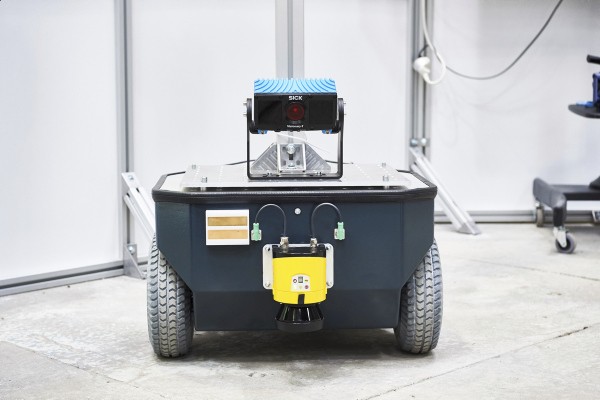
Views: 82
Sanitation in landfills, toxic waste sorting or nuclear plant reconstruction: where people work in health-threatening environments, which require complex and often incriminating protective measures. Remedies can be remotely controlled robots and stand-alone machines. For research and testing of the necessary technologies, there is now a place in Karlsruhe with the support of the German Federal Ministry of Education and Research (BMBF) is the Competence Center.
Courtesy by KIT: “ROBDEKON – robot for decontamination in hostile human environments.” A small bulldozer digs a hole at a certain point. No one is sitting in control, a computer in an aluminum box on the roof controls it. A futuristic vehicle that hangs four-wheeled mobile buildings with spider legs reveals its various modes of movement that can handle virtually any terrain. A humanoid robot independently picks up equipment from a collection of objects, looks from different angles, washes in a water bath, and dumps it into a container. These and many other projects at ROBDEKON show the potential of robots when it comes to decontamination activities.
“ROBDEKON unites key decision makers in decontamination robotics and creates the basis for sustainable cooperation to transfer innovations into practice,” says Dr Andrea Detmer, Head of the BMBF Civil Security Research Unit, during the opening of ROBDEKON and the inauguration of the new laboratory hall. “The Competence Center thus becomes a source of crystallization for developments that use artificial intelligence to generate very tangible added value for people who are exposed to potential health hazards every day, for example, in the recovery of landfills and contaminated sites. They should be relieved of stressful work and thus minimize the risks to life and limbs. ”
Günther Leßnerkraus, Head of the Department of Industry, Innovation, Industrial Research and Digitization at the Ministry of Economy of Baden-Württemberg, says: “Artificial intelligence is the key technology of the future – in virtually every area of life. ROBDEKON is an excellent example of the diverse applications of intelligent applications. Midsize companies in particular will benefit from the technologies developed here. ”
Karlsruhe Mayor Frank Mentrup congratulated the four research institutions involved – in addition to the IOSB Fraunhofer leadership of the Karlsruhe Institute of Technology (KIT), the science FZI Research computer and the Center of the German Center for Artificial Intelligence Research (DFKI) in Bremen ROBDEKON is one of only two research centers for robotic systems in misanthropic environments funded by the BMBF’s Civil Security Research Program. This underscores the special significance of the city of Karlsruhe as a place for science and technology and its appeal for future developments in dealing with robotic systems at the federal level. ”
Professor Jürgen Beyerer, head of Fraunhofer IOSB, a spokesman for ROBDEKON and chair of the KIT, explains the concept and current state of the competence center. “Since the start of funding in 2018, we have been able to build a unique research infrastructure that will combine all the necessary technological capabilities and develop them in a sustainable way,” says Beyerer. Robotics and hardware systems development, aspects of Artificial Intelligence such as environmental perception, orientation, movement planning or decisions under uncertainty, but also man-machine interaction are covered by the partners. Added to this is the exact knowledge of the application domains that the companies involved contribute.
As a central point of contact for all questions about robotics for decontamination tasks ROBDEKON is open to all who contribute to edit their projects with the support of experts from the center, as Beyerer emphasized: “We offer consulting services, such as cooperating with other research institutions and wish to establish an intensive dialogue with the relevant industry in order to develop targeted and viable solutions Our maxim is to maximize the benefits to society and the economy with our set of skills. ”
In total, six KIT teachers contribute to ROBDEKON. In addition to the speaker, Jürgen Beyerer are Rüdiger Dillmann, Sascha Gentes, Uwe Hanebeck, Björn Hein and Tamin Asfour, who coordinate KIT contributions.
Among the projects they bring include:

- ARMAR-6: The humanoid robot developed in the KIT has cognitive and motor skills that allow you to visually detect and seize unknown objects in unstructured scenes and perform certain operations. Thus, it can, for example, independently clean contaminated parts of the system in a bathroom and deposit them in the appropriate storage location.
- Increased Reality: The pollutant distribution is rebuilt from local concentrations of pollutants measured in landfills and then visualized as a 3D map through AR glasses.
- Scan robot: Using a light robotic robot equipped with a 2D light section sensor, this prototype shows how well-structured plant components can be detected with the appropriate scanning strategy to, for example, measure parts of the radioactive power plant.
- MAFRO: In a chain drive system, the upstream robot is transported to its application area. This is equipped with suction plates vacuum and able to climb walls.

- GammaBot: GammaBot has a differential drive. With its high-resolution 3D laser, digital images of the environment can be generated with millimetric precision. Room data is used to store additional information, such as thermal imaging, gamma spectroscopy, or ODL measurements on different layers.
About ROBDEKON
ROBDEKON is one of the two competence centers for robotic systems that BMBF has been supporting since 2018 under the “Research for Civil Security” program. The Fraunhofer Institute for Optronics, Systems Engineering and IOSB Image Evaluation in Karlsruhe coordinates the center. The research partners are the Karlsruhe Institute of Technology (KIT), the FZI Research Center for Computer Science in Karlsruhe and the German Center for Research in Artificial Intelligence GmbH (DFKI). The industrial partners involved are Götting KG, Kraftanlagen Heidelberg GmbH, ICP Ingenieursgesellschaft Prof. Czurda and Partner mbH and KHG Kerntechnische Hilfsdienst GmbH.
The term is initially four years. The goal is https://robdekon.de
Details on the Center KIT Information · Systems · Technologies: http://www.kcist.kit.edu
Leave a Reply